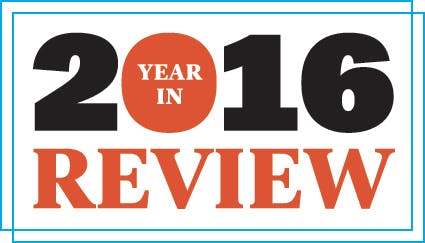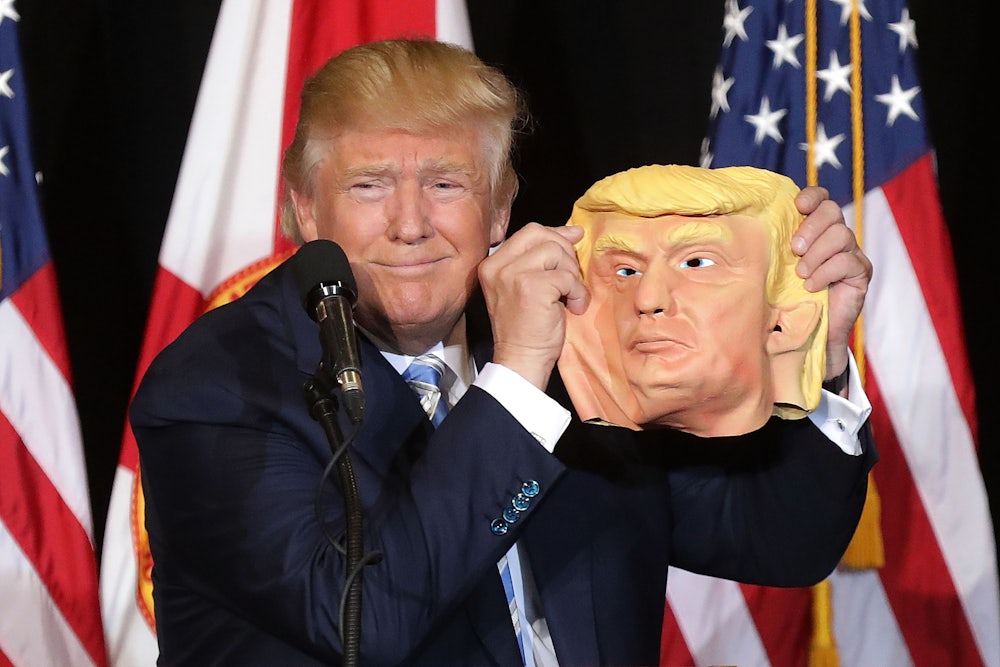
Politics is entertainment. It is drama and spectacle and performance. This has long been known, from the Lincoln-Douglas debates on down. We refer to campaign messages as “narratives,” and to the people involved as a “cast of characters.” We divide politicians into heroes and villains, heels and faces. We seek our reflection, no matter how imperfect, in the candidates we support, and they in turn seek our approval like actors grinning nervously at a darkened audience. The appeal of presidential politics, in particular, lies in being both heavily scripted and hastily improvised, both real and thoroughly fake, a postmodern house of mirrors in which the very nature of authenticity is in question.
And in 2016, we were enthralled. Donald Trump’s operatic campaign not only distracted us from his muddled and often contradictory policies—the supposed anchor tying politics to the real world—but also overran our cultural life, tainting every work of art, all popular entertainment, with the touch of his long shadow. There’s every reason to believe that it could get worse when he becomes president.
His was a story that played out on multiple media platforms: television, newspapers, Facebook. Thanks to social media especially, it permeated our daily existence in a way that was deeper and more inescapable than, say, binge-watching Stranger Things on Netflix. There were various cultural events this year that seized our collective attention for brief passages of time—the Game of Thrones finale, Beyonce’s Lemonade, the Cubs winning the World Series, Bob Dylan being awarded the Nobel Prize in Literature—but they were ultimately crowded out by the biggest, gaudiest entertainment of them all.
Trump was simply always there, in your Twitter feed, his orange avatar popping up between a quip from your colleague and a Vine of J.R. Smith. To call it reality television doesn’t even come close to doing the election justice. Reality television bears no genuine resemblance to reality, whereas President Donald J. Trump is becoming a reality before our very eyes, akin to a movie monster stepping out from the silver screen. Whether we were reading a book or watching a movie, there was always a sense that a larger, ongoing entertainment was awaiting our return; that as soon as we closed the book’s pages we would light up our phones to catch up on the latest about Trump.
Trump’s great strength as a politician has been to collapse the distinction between reality and fantasy, the public persona and the private person, the audience and the entertainer. On the final day of the campaign, he exhorted a crowd in Sarasota, Florida, to admire a rubbery replica of his face. “Look at this mask,” he said. “Oh wow. Wow, that’s beautiful. Look at that. Looks just like me.” Then he tossed the mask aside, as if to punctuate the point: There is no mask. There is only Trump, with all his ambitions and insecurities and many, many flaws swimming right at the surface. If a screenwriter had invented that scene for a movie about the 2016 race, he would have been accused of heavy-handedness. But that is the way this whole election has played out, as a low-rent dystopian fantasy of a shallow narcissist coming to power.
His victory has shrunk our bandwidth for cultural appreciation even further. If, like me, you were eagerly awaiting the end of the Trump Show, if you were hoping to indulge in this season’s Oscar hopefuls or finally get around to reading, I don’t know, the Alexandria Quartet, well, tough luck. The show goes on, and with it the inability to properly concentrate on anything else. Pity the likes of Michael Chabon, who released his fine new book in the midst of the election. Can a novel about hunting Nazi scientists compare to the ghastly plot developments that are revealed every time we load the The New York Times app? Are there fictional villains as frightening as Jeff Sessions and Rudy Giuliani?
And if the transition is any indication, then Trump’s presidency will be as full of diversionary entertainments as his candidacy, replete with “finalists” competing for cabinet positions, geopolitical dramas in the subcontinent set off by Dr. Strangelove-like shenanigans, and the occasional neo-Nazi retweet.
The problem is not only that culture was displaced by what was quite possibly the craziest political campaign in American history. That is understandable, especially given the real-world consequences that will ensue from the spectacle. It is that our cultural institutions—Hollywood, television, book publishing, the news media, the recording industry, the big three sporting leagues—were so impotent in the face of Trump’s rise. No matter how many times Samantha Bee or Trevor Noah eviscerated Trump, no matter how many Emmys were awarded to minorities, no matter how often Gregg Popovich proved himself to be the wokest coach in the NBA, it didn’t stop Trump’s march to the White House.
In a September column for The New York Times, Ross Douthat argued that popular culture’s ostentatious liberalism, particularly its insistence that the country “embrace the race-gender-sexual identity agenda in full,” had contributed to a conservative backlash that helped propel Trump’s campaign. Douthat wrote, “[I]t remains an advantage for the GOP, and a liability for the Democratic Party, that the new cultural orthodoxy is sufficiently stifling to leave many Americans looking to the voting booth as a way to register dissent.” To my mind, the column overstated the role of popular culture in fueling Trump’s movement, while underplaying the roles played by plain racism and white grievance. But if Douthat were right, and the popularity of Donald Trump represented a protest against social liberalism as championed by culture, then that would actually be a sign of progress—evidence that the message had at least provoked a response. Instead what we saw this election was the opposite: cultural figures on the left performing protests against Trump that had no impact at all and that appeared to have no purpose other than self-gratification.
In this category we could include the countless late-night takedowns and SNL parodies of Trump, and every politically-themed Lena Dunham video that failed to go viral. But perhaps the most hopeless example was the “Open Letter to the American People” that a group of writers, led by Andrew Altschul and Mark Slouka, signed. Written in what can only be called a mock-Declaration of Independence style, it is a banal list of the many reasons Trump is not qualified to be president, which concludes with a grandiose flourish: “For all these reasons, we, the undersigned, as a matter of conscience, oppose, unequivocally, the candidacy of Donald J. Trump for Presidency of the United States.” Cue the mic drop! As my colleague Alex Shephard noted at the time, “There is nothing brave or noteworthy about signing a generic petition saying you’re against Trump.” But what’s notable in retrospect is the abject powerlessness on display, the underlying sense that these writers felt they needed to do something, anything, about this malignant force over which they had no influence at all.
This division of culture and politics into two increasingly mutually exclusive spheres can be seen in the year’s most critically praised works of art. The winner of the National Book Award for fiction was Colson Whitehead’s The Underground Railroad, which reimagines the historical flight of escaped slaves from the antebellum South as taking place on a literal train. It was selected for the Oprah Book Club in August, instantly turning it into a bestseller. Two early contenders in the Oscar race—Loving and Moonlight—deal with the history of interracial marriage and the coming-of-age of a gay black man, respectively. In any other year, this would have felt like progress. This year, it felt like the entertainment industry was talking to itself. Just as we thought these works of art were articulating a new set of values, the rest of America was voting to reject them.
It is perhaps no coincidence that these works—embraced by liberal elites on the one hand, seemingly ignored by the many millions of people who voted for a bigoted demagogue on the other—deal with the issue of race. In electing a man who promised to reclaim America for whites, white America has shown in the most emphatic way that it is still incapable of looking at itself honestly. Nor is it able to understand the other groups with whom it is so reluctant to share this country. But this, too, is a failing of culture. If art’s role in historical progress is to assert our common humanity, and to elicit a moral sympathy for those who are otherwise foreign to us, then art in America, for all its best efforts, has come up tragically short.
Trump’s election represents a failure so wide-ranging that it would be silly to single out culture for blame. The primary culprit was a Republican Party that allowed itself to be hollowed out by rot, followed by any number of institutions: the press, the Democratic Party, the meritocracy, Wall Street, the education system, the Electoral College, you name it. But one of the lessons of the election is that, even though we live in an age of information, our best-reasoned arguments and most evocative cultural expressions were unable to dispel the grotesque fiction Trump spun, featuring a black interloper who stole the White House and a woman who fed for years at its trough. I know, as I type this, that these words will either fall on deaf ears or be ignored altogether by a certain segment of our polity (as well as those who are content to break out the popcorn as Trump burns it all down). And the main cultural struggle in the Trump years will be to penetrate that barrier and connect.
Ironically, Trump himself, like some freak genetic mutation, will probably serve as a catalyst for all kinds of new art forms that are better adapted to our time. Whatever those turn out to be, they will have to engage us in ways that cut through the incessant blare of a Trump administration. After all, you can leave a movie theater. You can put down a book. But you can’t switch off Donald Trump.
